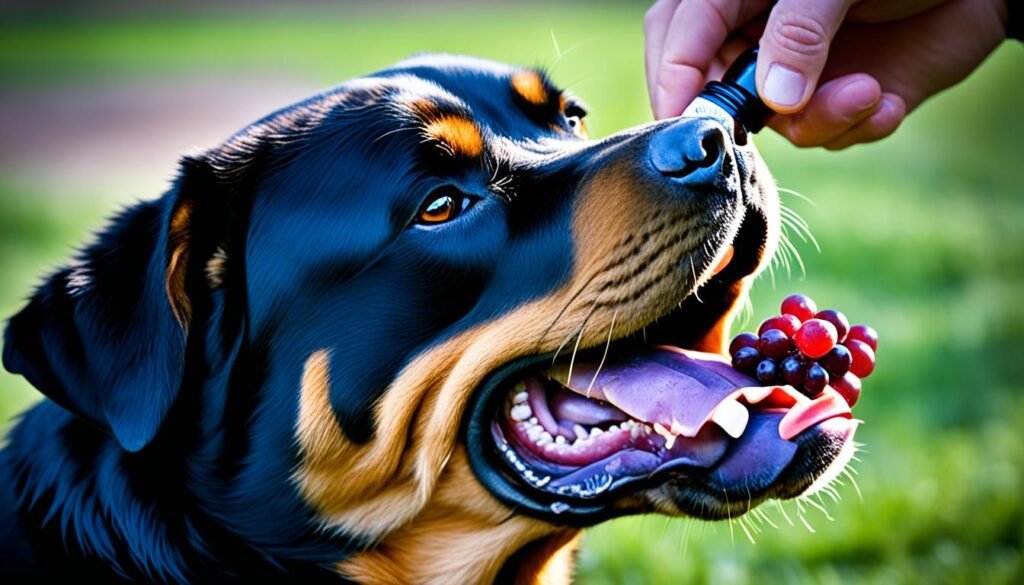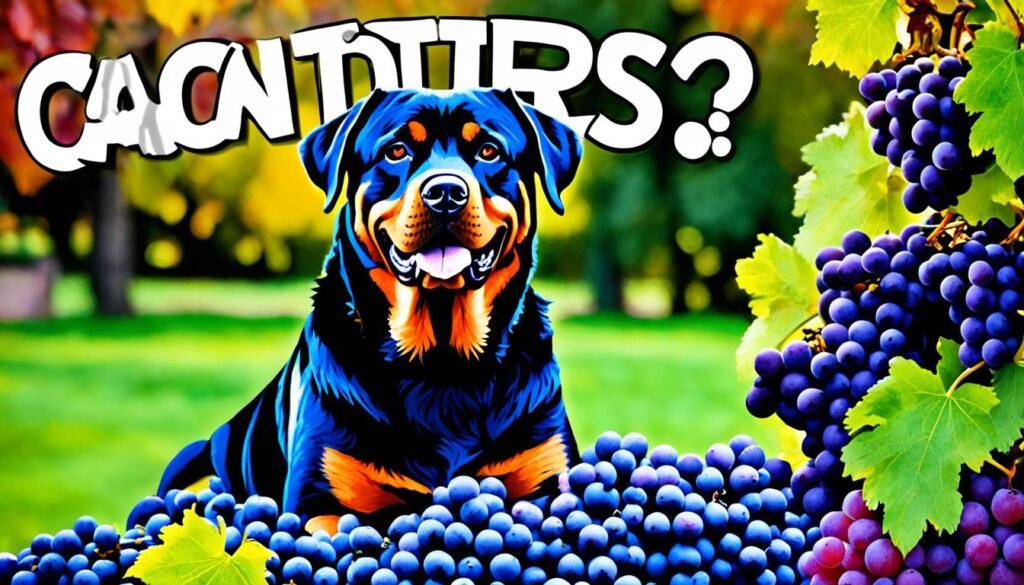As a proud Rottweiler owner and a firm believer in providing the best care for my furry companion, I understand the desire to offer them a variety of foods. However, it’s crucial to remember that not all human foods are safe for our beloved pets. Recently, I came across some alarming information about a particular food that I had no idea could be harmful to Rottweilers – grapes. This discovery left me shocked and concerned about the potential risks associated with grape consumption in dogs, especially my Rottweiler.
Like me, you may be wondering, “Can Rottweilers eat grapes?” To find the answer and protect the well-being of our furry friends, I decided to dive deep into this topic. In this article, we will explore the potential dangers of grapes for Rottweilers, the signs and symptoms of toxic ingestion, what to do if your dog eats grapes, and preventive measures to keep your Rottweiler safe. Let’s ensure the health and happiness of our Rottweilers by understanding the risks and taking necessary precautions.
Key Takeaways:
- Grapes and raisins are highly toxic to dogs, including Rottweilers, and can lead to acute kidney failure.
- Even a single grape can be dangerous for your Rottweiler, regardless of their breed, sex, or age.
- If your Rottweiler consumes grapes, it is crucial to contact a veterinarian immediately for prompt treatment.
- Signs of toxic ingestion include loss of appetite, lethargy, vomiting, diarrhea, abdominal pain, dehydration, increased thirst and urine production, and kidney failure.
- To prevent grape poisoning, keep grapes, raisins, and all grape-containing products out of your Rottweiler’s reach.
Signs and Symptoms of Toxic Ingestion
Grape poisoning in dogs can lead to various signs and symptoms that are important to recognize. If your Rottweiler has ingested grapes or raisins, it is crucial to be aware of these indications to ensure prompt medical attention and prevent further complications.
Some common signs of toxic ingestion in dogs include:
- Loss of appetite: Your dog may show a sudden disinterest in food or refuse to eat altogether.
- Lethargy: A noticeable decrease in energy levels or overall activity may be observed.
- Vomiting: Your Rottweiler may vomit either partially digested or undigested food.
- Diarrhea: Loose stools or increased frequency of bowel movements can occur.
- Abdominal pain: Your dog may exhibit signs of discomfort or tenderness around the stomach area.
- Dehydration: Reduced fluid intake or excessive fluid loss can lead to dehydration.
- Increased thirst and urine production: Your dog may display an intense thirst and urinate more frequently than usual.
- Kidney failure: Severe cases of grape poisoning can result in kidney failure, which can be life-threatening.
It is important to note that these symptoms may manifest within a few hours of grape ingestion. If your Rottweiler exhibits any of these signs after consuming grapes or raisins, it is imperative to seek immediate veterinary care. Contact your veterinarian without delay to discuss the situation and ensure appropriate treatment is initiated.
Understanding the Dangers
Grape poisoning in dogs should never be taken lightly as it can lead to serious health consequences. The toxic substances present in grapes, although yet to be fully identified, can cause severe kidney damage and failure. Therefore, it is crucial to be vigilant and proactive in safeguarding your pet’s well-being by preventing accidental ingestion of grapes and raisins.
What to Do if Your Dog Eats Grapes

If your Rottweiler consumes grapes or raisins, it is crucial to contact a veterinarian immediately. Grape ingestion in dogs can lead to serious health complications and requires emergency treatment. While inducing vomiting may be recommended in certain cases, it is essential to follow the guidance of a professional.
It is important to note that inducing vomiting should not be attempted if your dog is unconscious, having trouble breathing, or exhibiting signs of distress. Only a veterinarian can determine the appropriate course of action based on your dog’s specific condition. Prompt veterinary care is essential to prevent kidney damage and failure.
Remember, time is of the essence when dealing with grape poisoning in dogs. Delaying treatment can have severe consequences on your Rottweiler’s health. Always reach out to a veterinarian for immediate assistance if your dog ingests grapes or raisins.
Steps to Take if Your Dog Eats Grapes:
- Contact a veterinarian immediately
- Follow the veterinarian’s guidance
- Do not induce vomiting without professional advice
- Seek immediate veterinary care for prompt treatment
Preventing Grape Poisoning in Dogs
When it comes to keeping your Rottweiler safe and healthy, preventing grape poisoning is crucial. Grapes and raisins can be highly toxic to dogs, causing serious health issues such as kidney failure. To ensure the well-being of your furry friend, here are some essential pet safety tips to follow:
- Keep grapes and raisins out of reach: It’s important to store grapes and raisins in secure containers or cabinets that your Rottweiler cannot access. Make sure to keep countertops and tables clear of these harmful foods.
- Beware of other toxic foods: Grapes are not the only food that can be harmful to dogs. Take the time to educate yourself about other toxic foods like chocolate, onions, garlic, and xylitol. By knowing what to avoid, you can better protect your pet from potential dangers.
- Check food labels: Before sharing food with your Rottweiler, always read the labels carefully. Some products, such as certain types of snack bars or trail mixes, may contain raisins or grape derivatives. Avoid feeding these to your dog.
- Educate children: Teach children in your household about the dangers of grapes and raisins for pets. Ensure they understand not to feed these foods to your Rottweiler, even if they seem harmless. By involving everyone in the family, you can create a safer environment for your furry companion.
Conclusion
Grapes and raisins can pose a serious threat to the health of Rottweilers, leading to kidney failure and other severe health issues. It is essential for dog owners to be aware of the toxic nature of these fruits and take necessary precautions to ensure the safety and well-being of their furry companions.
If your Rottweiler ingests grapes or raisins, it is crucial to seek immediate veterinary care. Prompt treatment can help prevent further complications and minimize the risk of long-term damage to your pet’s kidneys.
To protect your Rottweiler from grape poisoning, always keep grapes, raisins, and grape products out of their reach. Make sure to educate family members, especially children, about the dangers of feeding these toxic foods to your beloved pet. Remember, being proactive and cautious about your dog’s nutrition and dietary choices is essential for maintaining their overall health and well-being.
Consulting with a veterinarian for expert advice on pet nutrition and ensuring a balanced diet will help keep your Rottweiler healthy and happy. By staying informed and taking necessary precautions, you can provide a safe and thriving environment for your four-legged friend.
FAQ
Can Rottweilers eat grapes?
No, grapes are toxic for Rottweilers and can cause severe health issues, including kidney failure.
What are the signs and symptoms of toxic ingestion?
Signs of toxic ingestion include loss of appetite, lethargy, vomiting, diarrhea, abdominal pain, dehydration, increased thirst and urine production, and kidney failure.
What should I do if my Rottweiler eats grapes?
If your Rottweiler eats grapes, it is crucial to contact a veterinarian immediately for treatment to prevent kidney damage and failure.
How can I prevent grape poisoning in my Rottweiler?
To prevent grape poisoning, keep grapes, raisins, and any products containing them out of reach of your Rottweiler. Check food labels for grape ingredients, and educate children about the dangers of grapes for pets.
Is it important to be cautious about the foods I give to my Rottweiler?
Yes, it is important to be cautious about the foods you give to your dog. Consulting with a veterinarian for a balanced and safe diet is recommended for your Rottweiler’s health and well-being.
